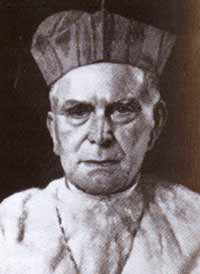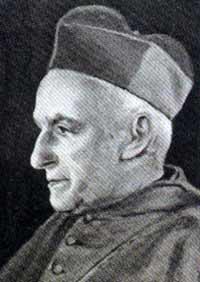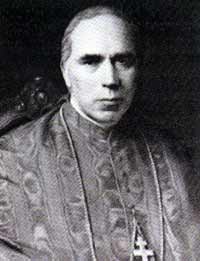ANNUAL MASS FOR THOSE WHO DIED IN 1916
HOMILY BY THE MOST REV GERARD CLIFFORD
AUXILIARY BISHOP OF ARMAGH
ARBOUR HILL, 9th MAY 2007
We gather today to commemorate those who fought and died for Irish independence in the 1916 uprising and especially to remember those buried in the cemetery here at Arbour Hill. Ninety one years later we look back at the ideals of those men and women who fought for Irish freedom, the sacrifices they made, their hopes for the future, the legacy that they have left to us and we ask some pertinent questions about the society of our time and how it measures up to those ideals.
It is well known that the events of Easter 1916 set in train a whole series of events that eventually would lead to Irish freedom. Easter 1916 became the catalyst that would awaken, in the minds of Irish people, the will and determination to campaign and fight for freedom and democracy. It changed an apathetic people into a formidable force for change and for freedom. The leaders of 1916 were agents of change. They were instrumental in the foundation of the Irish Free State. The importance of the Rising cannot be underplayed. It was a serious attempt at insurrection by people whose beliefs were soon to move from the fringe of political life to its very heart. In the words of William Butler Yeats;
‘All changed, changed utterly,
A terrible beauty is born’.
Today we are the inheritors of the aims and objectives of the Rising. Ninety years on we look back to the aims and objectives of those involved. The Proclamation was written at a time of widespread poverty, under-nourishment among the poor, considerable hunger and low life expectancy. Housing in certain areas was amongst the worst in Europe, unemployment was high and emigration to England and the U.S. was the only alternative to destitution for many people. Young people from all over the country had little option but to emigrate. Coupled with this the overall standard of education of the majority of the population was low which meant that when people did emigrate they did so to poorly paid and low skilled jobs.
Ireland of 2007 presents a very different picture. We currently have a confident economy, low unemployment and a good standard of living for many. Today we have a mainly confident and educated people. For some the country is awash with money, more mobile phones than people in the Republic of Ireland. Yet the affluence of many is full of anomalies.
October last year the Irish Bishops went on their ‘ad limina’ visit to Rome. The message of Pope Benedict at the conclusion of the visit spelled out some of those anomalies. He said;
‘The present time brings many new opportunities to bear witness to Christ and fresh challenges for the Church in Ireland. After centuries of emigration, which involved the pain of separation for so many families, you’re experiencing for the first time, a wave of immigration. Traditional Irish hospitality is finding unexpected new outlets. Like the wise householder who brings forth from his treasure ‘what is new and what is old’ (Mt.13:15) your people need to view the changes in society with discernment and here they look to you for leadership’
Indeed, Ireland, as we well know, has had an unprecedented influx of people to our country. People come here with buoyed up hopes for themselves and their families. They see Ireland as the land of opportunity; a place where dreams can be fulfilled. They feel welcome and most feel secure. For many Ireland is the new land of promise and opportunity. Some come here to escape from tyranny and poverty in their own country, others come to seek a livelihood, an opportunity to return home with new confidence and new financial security. Others come to a place they want to call home. They see Ireland as the land of welcome, the new land of promise for themselves and their families. ‘Failte Ui Cheallaigh’will hopefully live up to its name.
In the church context we know that migrants make a positive contribution to the Church to which they belong. For many their faith and their attachment to the Church give support and encouragement. They come with their own gifts. Already we have experienced much of this; their vibrancy in liturgical celebration, their harmonious musical tradition, their distinctive mode of celebration, their strong family involvement in every liturgical celebration, their popular piety, their support for each other. They have enormous strengths from which all of us can learn.
That presents a challenge to all of us. If I may quote words from the late Pope John Paul II when he was talking about the hopes for unity between the Orthodox Churches in the East and Rome, he said that we each have gifts to exchange. Equally I believe that with the recent phenomenon of migrants to our country we too have gifts to exchange. We have much to give but equally we have much to receive.
There are some 420,000 new migrants to Ireland at present making up 10% of our total population. We have large numbers of migrants from the UK, Poland, Lithuania, Nigeria, Latvia and several other countries. Many of the migrants are contributing to the workforce of our country and many are making a significant contribution to our economy and to our culture. They bring their distinctive cultural, religious and spiritual gifts to our people. The important factor in all of this is that we are challenged to encourage and allow diversity. They do not come to be subsumed into our way of life. They come to make their own distinctive contribution to our country.
I believe we are part of an overall process that involves different stages. The first is the stage of welcome assuring them a truly fraternal welcome. In the words of St. Paul; ‘Welcome one another as Christ welcomed you’ (Rom.15:7). At this stage they will depend greatly on local social services and support agencies. The key document on the Pastoral Care of Migrants from the Pontifical Council in Rome reminds us that mere tolerance is not enough. The next stage is the invitation to be part of the community through local projects, offering advice and opportunity, becoming involved in community, sharing their skills and their strengths with the local community. They seek affirmation and they seek to make their contribution to our society. The third stage is integration within the local community and the Church community. It is integration without being subsumed or forced. Ireland of the future, hopefully, will reflect the gifts of all, the culture, involvement and the contribution of all.
Those who arrive here have rights that go far beyond mere welcome. These include the right to provide for oneself and one’s family. It includes the right to a quality of life comparable to the rest of the community, the right to work, the right to protection in the workplace, the right to family life.
The Irish Bishops Conference at its March, 2007 meeting in Maynooth said;
‘We can readily see the invaluable contribution which has been made to our country and particularly to our economy by the thousands of migrant workers who have come to our country over the last decade. However, we must realise that those who have come here are not just workers but persons who have dignity and must be treated in ways that are just and fair. They are persons who have rights and entitlement not only in the workplace but in all other aspects of life, not least the right to family life’. This of course would include major issued like integration, recognition of a multi-faith society, a multi-cultural community, migrant identity and diversity.
I believe that all of us Church and State are challenged by this new situation. The Gospel message is clear. Jesus himself was an asylum seeker in Egypt, fleeing from the wrath of Herod. Mary was a migrant. The lack of welcome extended to her brings to mind the increasing number of women migrants worldwide who are victims of exploitation and trafficking. Christ’s sermon on the Mount challenges all of us;
I was hungry and you gave me to eat
Thirsty and you gave me to drink
A stranger and you made me welcome’.
In the Church we all have an indispensable part to play in that welcome. We can be key people in giving the feeling of belonging, to assure our visitors that they are participants and decision makers. Integration implies involvement, participation, joy in sharing, making a real contribution to society and to the Church without being subsumed by either. Mar a deireann an sean fhochal; ‘Ar scath a cheile a maireas na daoine’.
Ireland has, for generations, been familiar with the whole concept of emigration. Gaelic literature is full of stories of Irish emigrants heading out into an uncertain future. There were the traditional farewells, the ‘American wake’ as it was often called, the farewell that was for life. The emotional taking of leave is rehearsed many times in our Gaelic literature. Many of you will remember, from your school days, Mici Mac Gabhann’s ‘Rotha Mor an tSaoil’, Padraig O Conaire’s ‘Deoraiocht’, Seosamh and Seamus Mc Grianna’s short stories and many others writing about the pathos of it all, the grieving that was involved. Of course many will also remember the letters home, the clothes parcels and the registered letter that ensured that those at home were not forgotten. Today thankfully things have change greatly. For the most part those who emigrate from Ireland do so freely and not out of compulsion. The mobile phone ensures that there is constant contact but the journey of the heart is still painful. It is no different with the migrants to our country.
There are currently some 100 religious services in place in Ireland for some 14 ethnic groups with 41 chaplains providing these services. We now have priests and religious full-time or part-time ministering to the Polish, Portuguese, Lithuanian, Latvian, Filipino, African and other ethnic groups. Some of those ministering to our migrants are from the migrants own countries, others are native Irish priests, religious and lay people conversant in the different languages. These Church services provide a space for people to gather. People come, not just for the religious event, but also to build bonds of friendship and community.
Much of this work is part of the journey towards integration. When that integration comes about hopefully our migrants will feel that they are part of our community. They will be the Irish with their own distinctive culture guaranteed and shared with the community. Many Government schemes including the National Action Plan Against Racism are doing invaluable work. Other State groups like the Social Services, the Gardai, the Vocational Education Committees and the Health Boards are instruments of welcome and of integration. The Bishops’ Commission for Emigrants and Migrants together with numerous voluntary groups within the various Churches and communities are making their own distinctive contribution.
I believe that Ireland is making its own distinct efforts to address this new situation. At many levels across the country there are positive efforts to cultivate a culture of welcome. There are still bridges to cross. We are challenged to raise people’s sights to what is ultimately fulfilling, recognising the giftedness and uniqueness of every one. It is a life’s work. I believe that it is also a recognition of the aims and objectives of those who struggled for independence more than ninety years ago. Mar a deireann an sean fhocal; ‘Ni neart go cur le cheile’. There is real strength when we work together. It is the only way forward and it is the way of the follower of Christ.
 Born in March 1861 in Ballygawley, Co. Tyrone, in the Archdiocese of Armagh, Joseph MacRory studied at St Patrick’s College, Armagh and St Patrick’s College, Maynooth. He was ordained a priest in 1885 and undertook post-graduate studies in Maynooth in 1884-86. He served on the staff of Alton Seminary, Birmingham, as Professor of Moral Theology and Sacred Scripture in 1886-87. He became the first president of St Patrick’s Boys’ Academy, Dungannon in 1887 where he served until 1889 when he became a member of the staff of St Patrick’s College, Maynooth. He served on the staff of Maynooth in 1889-1915 during which time he held the chair of Sacred Scripture and Oriental Languages (1889), chair of Hermeneutics and New Testament Exegesis (1905) and Vice-President (1912). He was appointed Bishop of Down & Connor on 9 August, 1915, and ordained Bishop on 14 November, 1915. He was appointed Archbishop of Armagh and Primate of All Ireland on 22 June 1928. He was named a cardinal on 12 December, 1929, and assigned the titular church of San Giovanni a Porta Latina. He died on 13 October 1945 and was buried in St Patrick’s Cemetery, Armagh. His episcopal motto was Fortis in Fide (Strong in Faith).
Born in March 1861 in Ballygawley, Co. Tyrone, in the Archdiocese of Armagh, Joseph MacRory studied at St Patrick’s College, Armagh and St Patrick’s College, Maynooth. He was ordained a priest in 1885 and undertook post-graduate studies in Maynooth in 1884-86. He served on the staff of Alton Seminary, Birmingham, as Professor of Moral Theology and Sacred Scripture in 1886-87. He became the first president of St Patrick’s Boys’ Academy, Dungannon in 1887 where he served until 1889 when he became a member of the staff of St Patrick’s College, Maynooth. He served on the staff of Maynooth in 1889-1915 during which time he held the chair of Sacred Scripture and Oriental Languages (1889), chair of Hermeneutics and New Testament Exegesis (1905) and Vice-President (1912). He was appointed Bishop of Down & Connor on 9 August, 1915, and ordained Bishop on 14 November, 1915. He was appointed Archbishop of Armagh and Primate of All Ireland on 22 June 1928. He was named a cardinal on 12 December, 1929, and assigned the titular church of San Giovanni a Porta Latina. He died on 13 October 1945 and was buried in St Patrick’s Cemetery, Armagh. His episcopal motto was Fortis in Fide (Strong in Faith).




You must be logged in to post a comment.